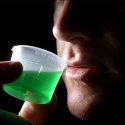Understanding what alcohol does to your body
The holiday season brings plenty of reasons to celebrate and with them the temptation to eat and, perhaps, drink a little more than is wise. As we all know but sometimes forget, drinking too much inevitably leads to headaches, loss of energy and generally feeling rotten. But there’s only one sure way to avoid a hangover, says Tyler Cymet, a doctor of osteopathic medicine and an emergency room physician at Northwest Hospital. And we know what it is, don’t we?
Is alcohol something that people should avoid?
Alcohol is a drug that has specific effects and side effects that are dose-dependent. Any time you take a drug, you should know why you are taking it, what the desired effect is, and weigh that against the side effects of the drug.
But some people can drink alcohol and not have any effects at all. That is because the dose was low and not sufficient to cause noticeable effects.
What are some of the first noticeable effects?
Certain people are more sensitive to alcohol, and to certain types of alcohol. If you drink and you feel sweaty or feel warm and flush right away, then your body is not getting rid of the alcohol in as efficient a manner as you might like, and the alcohol that does this to you is more likely to have a more serious side effect, specifically hangovers or intoxication.
We also know that alcohols – such as brandies, fortified wines, grain alcohol – that are over 15 percent will have greater effects on the stomach, like swelling and will lead to a quicker and more serious effect.
What kinds of effects does alcohol have?
Alcohol will have effects on your muscles, your stomach and on the brain. After taking a therapeutic dose of alcohol (usually considered the equivalent of one shot of hard alcohol an hour) a person’s temperature drops, his heart speeds up a bit and he becomes less coordinated because of the brain fog and the changes in the muscles. People may feel warmer on the outside and colder on the inside as blood flow gets shunted to the superficial arteries and veins.
Why do people who drink typically get so clumsy?
Alcohol blocks the ability of the body to absorb calcium, magnesium and other minerals that muscles need to function. So muscle coordination already is off and, simultaneously, the brain is using alcohol instead of sugar as a fuel, which doesn’t let the body run as smoothly as it does when it is running on the right type of fuel (sugars).
Are hangovers a common side effect of drinking?
Hangover is the name given to the collection of symptoms people may see after overdosing on alcohol. The muscles and brain either did not have enough of a reserve to overcome the assault of alcohol on the brain and muscles, or the dose of alcohol was too high for the body to tolerate.
What is the hangover syndrome?
A hangover usually occurs from eight to 24 hours after drinking alcohol. It starts when the alcohol level hits zero (although it can happen sooner). And generally lasts from 24 to 36 hours.
Its symptoms typically are sore, achy muscles, a change in the pattern of a person’s bowel habits, lack of energy, headache, sensitivity to light and discomfort with food.
The alcohol lets you know when you are heading to a hangover: Alcohol makes you urinate more often leading to a loss of necessary nutrients coupled with a decreased ability to process and take in more minerals and other nutrients. If you are urinating a lot you are developing an electrolyte imbalance and that is when the muscles start to ache, you have no energy, headaches, sensitivity to light. And you are going to start getting light-headed or dizzy.
Once you’ve made the mistake of drinking too much alcohol, is there anything that can be done to alleviate a hangover?
We hear about drinking milk beforehand or caffeine afterward; we hear about IVs; we hear about taking Motrin before going out to prevent a hangover, but there is nothing [other than not drinking alcohol] that we really know about preventing or curing hangovers – it is all guesswork. And the treatments usually address one of the symptoms of a hangover and not the whole hangover syndrome. We know how alcohol works on the body and since you already know the root cause of a hangover, you know how to prevent a hangover.
source: Baltimore Sun
